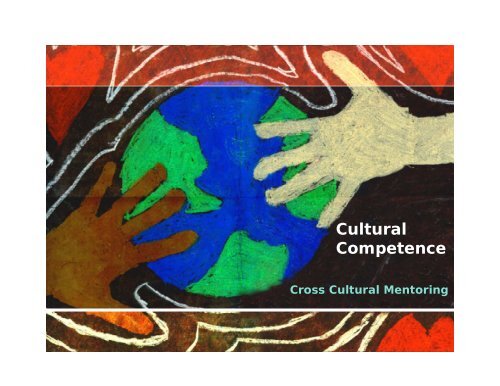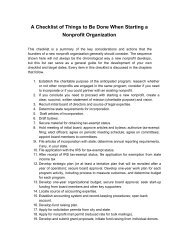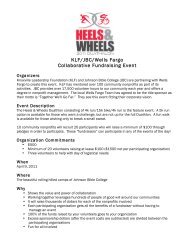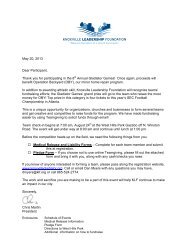Cultural Competence
Cultural Competence
Cultural Competence
Create successful ePaper yourself
Turn your PDF publications into a flip-book with our unique Google optimized e-Paper software.
<strong>Cultural</strong><br />
<strong>Competence</strong><br />
Cross <strong>Cultural</strong> Mentoring
Overview<br />
• WHAT: Define <strong>Cultural</strong> <strong>Competence</strong>, and<br />
its internal terms, “culture,” and<br />
“competence”<br />
• WHY: Rationale for <strong>Cultural</strong> <strong>Competence</strong><br />
in Mentoring<br />
• HOW: Walk through the Steps of Building<br />
<strong>Cultural</strong> <strong>Competence</strong> in Mentor<br />
Relationships<br />
• WHERE: “Within” Self-assessment &<br />
reflection and “Without” Building Rapport<br />
with Youth
Though Different, Our Paths Have<br />
Similar Turns: Prepare for the Journey!<br />
Perhaps travel cannot prevent<br />
bigotry, but by demonstrating that<br />
all peoples cry, laugh, eat, worry,<br />
and die, it can introduce the idea<br />
that if we try and understand each<br />
other, we may even become<br />
friends.<br />
Maya Angelou
<strong>Cultural</strong> <strong>Competence</strong> is…<br />
…a set of behaviors, attitudes,<br />
and practices that come<br />
together in relationships<br />
(interpersonal and<br />
professional) that empowers<br />
the individuals to work<br />
effectively in cross-cultural<br />
situations<br />
h
<strong>Cultural</strong> <strong>Competence</strong> Framework<br />
Behaviors<br />
Practices<br />
CLC<br />
Policies<br />
Attitudes<br />
Structures
Five Elements of <strong>Cultural</strong> <strong>Competence</strong><br />
Individual Level<br />
(1) Acknowledge cultural differences<br />
(2) Understand your own culture<br />
(3) Engage in self-assessment<br />
(4) Acquire cultural knowledge & skills<br />
(5) View behavior of self & others<br />
within a cultural context
<strong>Cultural</strong>ly competent mentoring:<br />
The ongoing process of gathering and<br />
utilizing knowledge, information<br />
and data from and about your<br />
mentee, his/her family, his/her<br />
peers, and his/her community.<br />
This information is integrated and<br />
serves to transform specific skills<br />
and strategies that enhance the<br />
quality and effectiveness of your<br />
mentoring relationship.
Four Step Model of Building CLC:<br />
A plan for working effectively and respectfully with<br />
youth/families from a variety of backgrounds<br />
1)Learn about culture and<br />
important cultural components<br />
2) Learn about your own culture through a process of<br />
self-assessment that includes examining your own<br />
culture’s assumptions and values and your<br />
perspectives on them<br />
3) Learn about the individual young people (and<br />
families) in your program<br />
4) Learn as much as possible about important aspects<br />
of their cultural backgrounds
Step One: Learn About Culture<br />
Culture is defined as….<br />
….The body of learned beliefs,<br />
traditions, principles, and guides<br />
for behavior that are commonly<br />
shared among members of a<br />
particular group. Culture serves as<br />
a road map for both perceiving and<br />
interacting with the world.
Components of Culture<br />
• Language & Communication Style<br />
• Family Relationships<br />
• Gender/Sexual Identity<br />
• Sexual Orientation/Sensuality/Sexualization<br />
• Race & Ethnicity<br />
• Religion & Spirituality<br />
• Class & Socio-Economic Status (SES)<br />
• Health Beliefs<br />
• Levels of Acculturation<br />
• Immigration Status<br />
• Perception of Political Power<br />
• Impact of Racism and History of Oppression
Iceberg Theory of Culture<br />
Most important cultural considerations exist<br />
beyond the surface!<br />
Culture is NOT just race/ethnicity!<br />
Other Important Considerations:<br />
• Individualist/Collectivist Views<br />
• High vs. Low Comfort Level with<br />
Uncertainty/Risk Taking<br />
• Internal vs. External Locus of Control<br />
• Monochronic vs. Polychronic Time<br />
• Indirect vs. Direct Communication Styles<br />
• Types of Nonverbal Communication Styles<br />
Don’t Assume….Ask!
Four Step Model of Building CLC:<br />
A plan for working effectively and respectfully with<br />
youth/families from a variety of backgrounds<br />
1) Learn about culture and important cultural<br />
components<br />
2)Learn about your own culture through<br />
a process of self-assessment that<br />
includes examining your own<br />
culture’s assumptions and values and<br />
your perspectives on them<br />
3) Learn about the individual young people (and<br />
families) in your program<br />
4) Learn as much as possible about important aspects<br />
of their cultural backgrounds
Step Two: Self-Assessment<br />
Stepping through the<br />
Looking Glass…<br />
Un-normalizes your view, so<br />
that you can understand<br />
that everyone has their<br />
own way of looking at and<br />
understanding the world<br />
• Happens in Process<br />
• May Be Quite Personal<br />
• Changes Perspective,<br />
opening up what you see<br />
as “normal” through your<br />
interactions with others<br />
who have different<br />
viewpoints<br />
'If you think we're wax-works,' he said,<br />
'you ought to pay, you know. Waxworks<br />
weren't made to be looked at for<br />
nothing, nohow!'<br />
'Contrariwise,' added the one marked<br />
'DEE,' 'if you think we're alive, you<br />
ought to speak.‘—Tweedledee &<br />
Tweedledum, Lewis Carroll
A Thought Exercise on<br />
Privilege<br />
• What are “American” Values What are<br />
institutional values<br />
• How are the “Norms” decided upon in our<br />
institutions<br />
• Which Groups have those Rules Favored<br />
• What Groups or Cultures play may have a<br />
different set of “norms”<br />
• How have groups been affected historically,<br />
socially, economically by marginalization<br />
• In what ways, through which processes, have<br />
the “Norms” changed historically
Let’s Play A Game!!!<br />
Our Exercise on Race, Class,<br />
and Privilege may provide<br />
some answers…
Four Step Model of Building CLC:<br />
A plan for working effectively and respectfully with<br />
youth/families from a variety of backgrounds<br />
1) Learn about culture and important cultural<br />
components<br />
2) Learn about your own culture through a<br />
process of self-assessment that includes<br />
examining your own culture’s assumptions and<br />
values and your perspectives on them<br />
3)Learn about the individual young<br />
people (and families) you serve<br />
4) Learn as much as possible about important<br />
aspects of their cultural backgrounds
Step Three: <strong>Cultural</strong> Discovery<br />
Engaging in a process of learning about an<br />
individual, family, or community’s cultural<br />
values, beliefs, and behaviors.<br />
No significant learning occurs without significant<br />
relationship.—Dr. James Comer<br />
Remember:<br />
Culture is viewed and<br />
understood through<br />
your own lens… and it<br />
requires investigation<br />
beyond the surface
Earning the Right to Be Heard<br />
Rapport = connection, especially harmonious or<br />
sympathetic, an understanding<br />
• Set the tone for open communication<br />
• Watch your language—neutral adult, not<br />
“parental”<br />
• Build Trust—be consistent!<br />
• Empower Your Mentee—teach problem solving<br />
skills rather than giving solutions; allow them<br />
to give input and make small decisions<br />
• Ask Questions! Seek First to Understand, then<br />
to Be Understood
Discovering Youth: Developmental<br />
Considerations<br />
• Preschool (Ages 2-5)<br />
• Elementary (Ages 5-10)<br />
• Pre-teen (Ages 10-13)<br />
• Teen (Ages 13-18)<br />
Look for similarities.<br />
Explore differences!
Understanding Disadvantage: Socio-<br />
Economic Considerations<br />
Generational Poverty = Life in impoverished<br />
situation for two or more generations;<br />
carries its own culture, hidden rules, and<br />
belief systems<br />
• Background “Noise”<br />
• Significance of Entertainment<br />
• Oral Language Tradition<br />
• Survival Orientation<br />
• Gendered Expectations<br />
• Ownership of People<br />
• Attitudes towards Discipline<br />
• Polarized Thinking<br />
• Lack of Order/Organization
Recognizing Risk: Considerations for<br />
Children of Incarcerated Parents<br />
Prison Subculture: the values & behavioral patters and<br />
characteristics of prison inmates, that often extend to<br />
family members & to communities largely populated<br />
by those exposed to the penal system<br />
• Group Identity & Norms<br />
• Distrust of Agencies, Organizations, Government and<br />
anyone they feel represents these institutions<br />
• Secretive Behaviors & Fear of Punishment<br />
• Exposure to Illegal/Dangerous/Violent Activity<br />
• Exposure to Grief/Trauma<br />
***Don’t force mentees to talk about difficult topics, but<br />
be available to listen/support if they open the<br />
discussion—in their own time & at their own level***
How You Help: Developing<br />
Protective Factors<br />
The mentee/mentor relationship offers the opportunity to<br />
introduce & reinforce factors that research has shown to<br />
help at-risk youth develop into successful adults. Look<br />
for opportunities to encourage these in your mentee:<br />
• Resilient temperament<br />
• Sense of self-efficacy and self-advocacy<br />
• High expectations<br />
• Healthy view of and stable relationship with a<br />
parent/caregiver<br />
• Connection to adults and peers who hold positive<br />
attitudes and ‘model’ positive social behaviors<br />
• Opportunities for involvement in meaningful<br />
activities<br />
• Ability to develop social & reasoning skills, and<br />
receive recognition & due praise
Step Four:<br />
Discover Cultures<br />
Continue the Journey towards CLC… and Challenge Others<br />
To Do the Same<br />
• Spend Time Getting to Know and Interacting with<br />
Youth/Family Members/Co-Workers/Community<br />
Members to learn perspectives outside of your own<br />
• Believe in and Create Environments for Mutual<br />
Respect and Mutual Learning<br />
• Don’t Be Afraid to Ask Questions and Actively Listen<br />
to Answers<br />
• Seek First to Understand, Then to Be Understood<br />
• Like People, and if Possible, Love Them<br />
As long as you think you're green, you'll grow. As soon as you think you're ripe, you'll rot. - Scott<br />
Horton
For More Information Contact & Future<br />
Trainings Contact:<br />
Chrystal D. Armstrong<br />
Youth/<strong>Cultural</strong> & Linguistic Competency<br />
Coordinator<br />
Phone: (865) 523-0701<br />
Email: carmstrong@tnvoices.org





